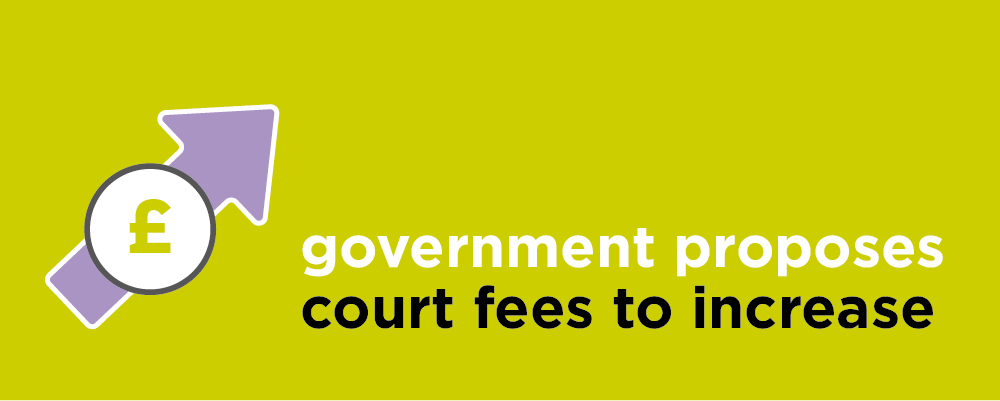- Basildon 01268244144
- Chelmsford 01245453800
- Colchester 01206217300
- London 020 4586 1280

31 August 2021 saw the government publish its response to a consultation process into court fees and proposed increases.
A majority of respondents to the consultation opposed such a move, considering now was not the right time due to the impact that Covid has had on individuals and businesses and because of concerns about the service levels provided by the court. However, despite this, the government has decided to press on with the increases which will see a significant increase across the board in respect of fees payable to the court.
Dealing with criticism of the proposed increases, the government considered that the increases would be offset by extended thresholds to the support available to those unable to afford the fees and acknowledging that some court users ‘might sometimes be frustrated by the service they receive’, said the increased costs are only intended to cover rising costs and were not about profiting from court users.
The response notes that in 2019/20 HMCTS received £724m from fees against its £2bn running costs. The changes will raise an estimated gross income of between £23m and £29m a year, falling to £20m-25m once fee remissions are accounted for.
The government response states: ‘The proposed increases reflect historic inflation and are therefore not an increase in real terms. The income generated from these proposals will go towards the running cost of HMCTS and will ensure that the courts and tribunals can continue to deliver access to justice for all.’
The increased fees are due to take effect from 30 September 2021 and as something impacting court applications across the majority (if not all) legal issues, family lawyers and their clients will not escape this increase.
Some of the most frequent family court applications and their costs are set out below.
| Application | Current Fee | New Fee |
|---|---|---|
| Divorce Application | £550 | ££593 |
Application for a child arrangements order, specific issue order or prohibited steps order | £215 | £232 |
| Application for a Financial Remedy Order | £255 | £275 |
| Application for a consent order | £50 | £53 |
| Applications on notice | £155 | £167 |
| where no other fee applies |
With regards to the help available to those with low incomes, this help is subject to an applicant being able to show that their gross monthly income is below a certain amount.
A single person whose income is less than £1170 (was £1085) or a couple whose joint income is less than £1187 (was £1345) will not have to pay the court fees. These amounts are also increased by £265 (was £245) for each child the applicant has living with them.
If the applicant has an income higher than this, they may still get some help with the court fees depending on the amount of the court fee and subject to a maximum income cap of £5170 (was £5085 for a single person and £5345 (was £5245) for a couple. Once again, where the applicant has responsibility for a child, these limits are then increased by a further £265 (was £245) per child.
Unfortunately, these court fee increases are going to add to the costs of resolving issues through the court.
It is, however, worth remembering that whilst some applications are necessary (for example it is only possible to get divorced if an application is made to the court and even if an agreement can be reached in relation to financial issues linked to the divorce proceedings, the only way to ensure it is final is to have a consent order), it is not always necessary to have to make an application to the court to resolve a dispute in relation to financial matters nor the arrangements for children.
There are a wide range of dispute resolution options available including solicitor negotiation, mediation, collaborative law and family arbitration. Whilst a court application may be necessary to ensure that issues are resolved if an agreement cannot be reached, choosing the right process can have a huge outcome in respect of the costs, the time involved and also the emotional impact of addressing the dispute.
At Birkett Long LLP, our divorce and separation lawyers are specialists in our field and we are able to advise in relation to the full range of family law issues arising between individuals. We are committed to providing practical advice that helps our clients achieve their best outcome. For more information as to how we can help, we offer a free 15 minute telephone call. I can be contacted via karen.johnson@birkettlong.co.uk on 01206 217305.



Comments